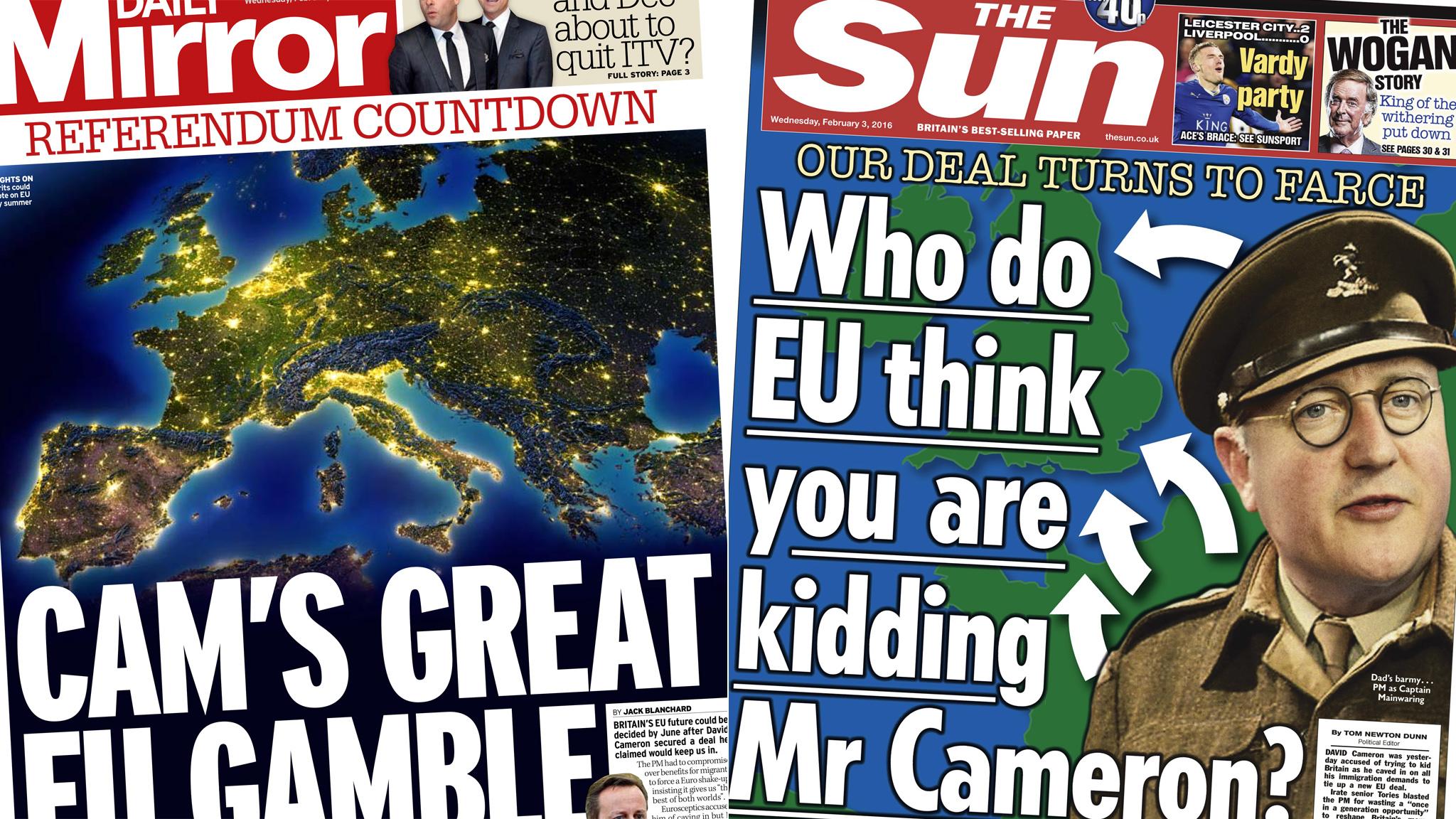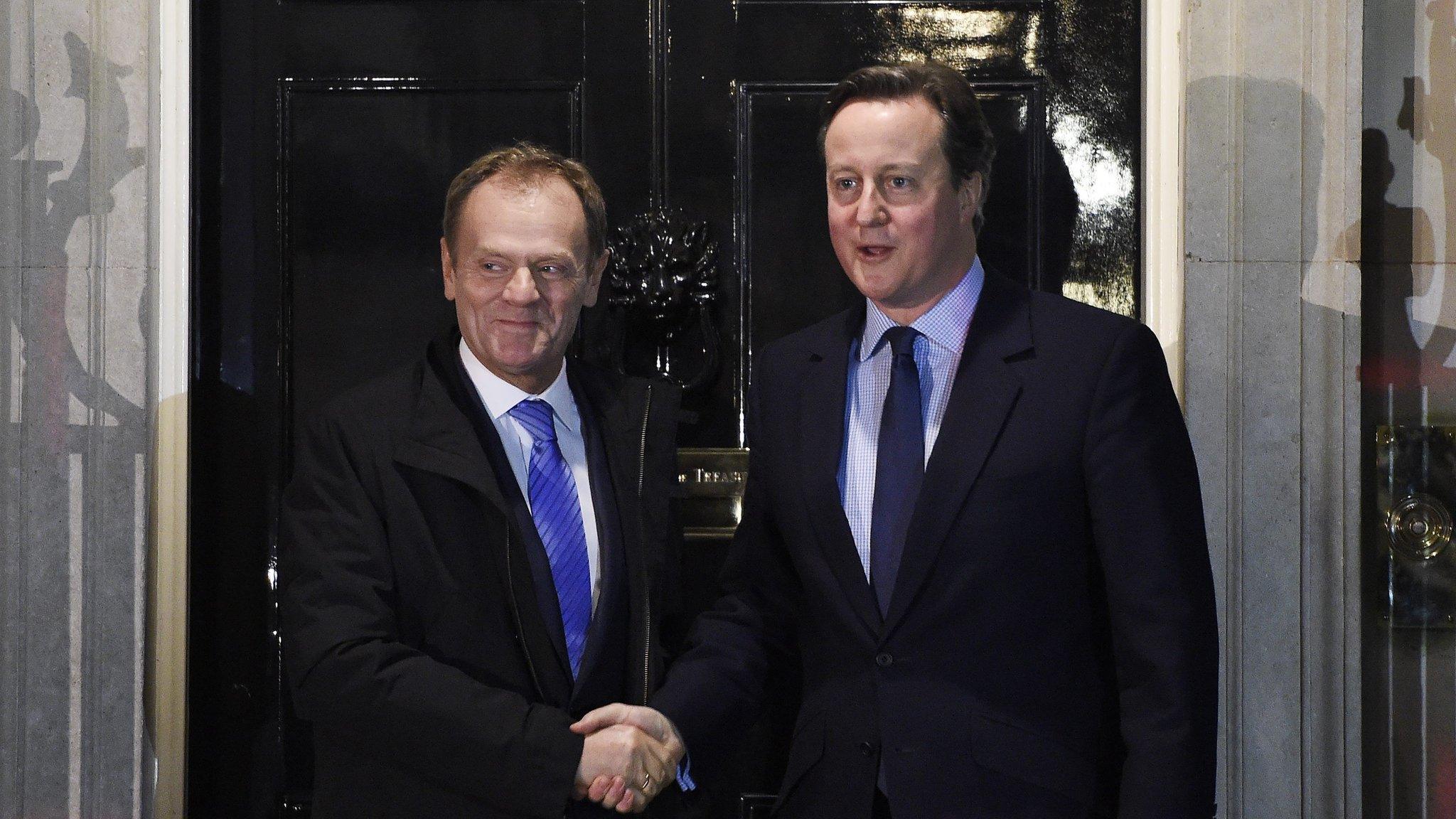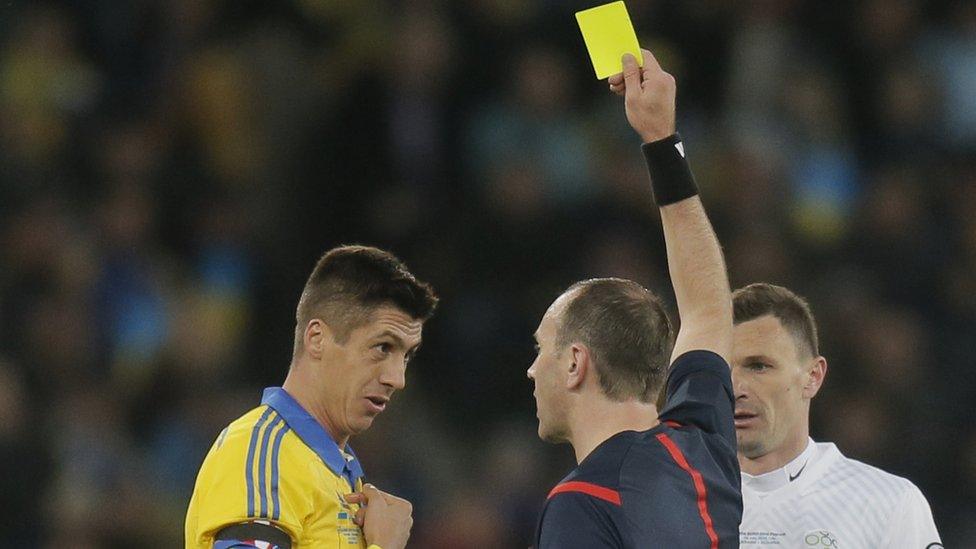EU referendum: Cameron 'happy to be judged' on draft deal
- Published
In full: David Cameron interview with Laura Kuenssberg
David Cameron says he is "happy to be judged" on his EU reform deal after facing a grilling from MPs.
London Mayor Boris Johnson was among those to question the proposals - which pave the way for the UK's EU referendum to be held in June - asking how they would restore UK sovereignty.
He also said the PM was "making the best of a bad job".
Mr Cameron said "intense negotiations" lay ahead but told the BBC the draft deal was a "big step forward".
European Council President Donald Tusk, who published the draft deal aimed at satisfying the UK's demands for EU reform, will meet David Cameron in London on Thursday.
An EU source said this would be a chance for the two to discuss the state of play in the negotiations,
Mr Cameron is aiming to get agreement from all member states at an EU summit in Brussels in a fortnight.
French president Francois Hollande said no further changes should be agreed at this stage.
He told reporters a compromise had been found "to find solutions to problems that until now seemed difficult to resolve", but added there could be "no new adjustments (or) new negotiations" at the summit.
'Not perfect'
Earlier, Mr Cameron faced two hours of questions from MPs on the draft agreement unveiled by the EU aimed at satisfying his demands for reform of the UK's relationship with Brussels.
Responding to Mr Johnson, he jabbed his finger on the despatch box to emphasise his point, telling his Conservative colleague: "I am not saying this is perfect, I am not saying the European Union will be perfect after this deal - it certainly won't be - but will the British position be stronger and better? Yes it will."
David Cameron answers Boris Johnson point on EU during statement
In his answer, the prime minister also said he would introduce measures to put the UK Parliament's sovereignty "beyond doubt" at the same time as concluding his EU negotiations.
BBC deputy political editor James Landale said this suggested how the PM might attempt to persuade Mr Johnson to back the campaign to remain in the EU.
The London mayor has previously argued that it would be better if Britain was able to block EU laws on its own, without having to rely on the support of other member states.
'More to do'
Asked before the debate about whether he supported Mr Cameron's reforms, he said: "Most people looking at this will think there's a lot more to do."
Some of the key speakers from the Commons debate on the EU treaty reform proposals
In an interview with BBC political editor Laura Kuenssberg, Mr Cameron denied having compromised over welfare curbs for EU migrants and defended his decision to ban ministers from campaigning to leave the EU until after the summit.
Everyone in government, he said, was "committed to making these renegotiations as good as they can possibly be".
But the BBC understands several Eurosceptic ministers - including Commons leader Chris Grayling - are discussing whether to break ranks before Mr Cameron announces the date of a referendum.
Former defence secretary Liam Fox said he was "certain" four or five cabinet ministers would eventually join the campaign to leave, adding that the offer on the table meant that "what we can get, at best, is better membership of the wrong club".
Four or five cabinet members are "certain" to campaign to leave the EU says Liam Fox
Mr Cameron told MPs the details would need to be pinned down during the course of the "intense" round of negotiations - but the draft deal hammered out with top EU officials was the strongest ever achieved on freedom of movement rules.
Boris Johnson early on Wednesday: PM 'making best of bad job'
The prime minister urged Tory MPs to vote "with their hearts" based on what they believed was right for Britain and not what "might be advantageous" to them personally.
That did not stop Eurosceptic Tory MPs lined up to criticise it, with Jacob Rees-Mogg saying Mr Cameron had two weeks to salvage his reputation as a negotiator after serving up "thin gruel" which had been further watered down.
First ministers protest
Labour leader Jeremy Corbyn said his party wanted the UK to remain in the EU but he dismissed the prime minister's renegotiations as a "smoke and mirrors sideshow" and said he had "ended up exactly where he knew he would be, making the case to remain in Europe".
In a separate development, the first ministers in Scotland, Wales and Northern Ireland have written to Mr Cameron calling on him not to hold the EU referendum in June.
At Prime Minister's Questions, Mr Cameron insisted voters would be "perfectly capable" of coping with two separate ballots.
In full: Nigel Farage speech to European Parliament
UKIP leader Nigel Farage, meanwhile, told MEPs Mr Cameron's deal was "hardly worth the wait" and "really rather pathetic", adding that it had "no treaty change, no powers returned, and no control of our borders".
But European Commission President Jean-Claude Juncker talked up the draft deal in a speech to the European Parliament, saying it addressed Mr Cameron's concerns "while respecting the treaties".
Draft EU deal 'is fair to all' says Juncker
The draft deal includes an "emergency brake" to restrict in-work benefits for EU migrants. But it would have to be agreed by other EU nations and it would be "graduated", with more money from tax credits paid to migrants the longer they remain in the UK.
The draft says Mr Cameron's demand to exempt Britain from the EU principle of "ever-closer union" between member states would be written into a future treaty. There are also measures relating to protection for non-euro countries in the EU, to a new way for member states to club together to block some new EU laws and on business regulations.
- Published3 February 2016

- Published2 February 2016

- Published30 December 2020

- Published2 February 2016

- Published2 February 2016